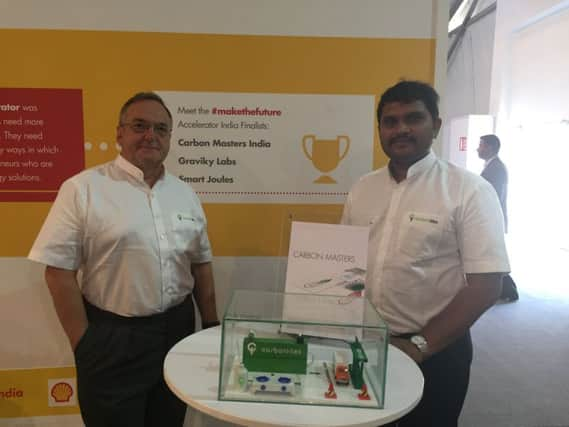Scots inventor leads low-carbon kitchen revolution in Bangalore


Kevin Houston, 65, was in his late 50s when he left his job to join the Carbon Masters project at Edinburgh University after being inspired by Al Gore’s film on global warming, An Inconvenient Truth.
Now, more than eight years later, Houston and his business partner, Som Narayan, who also studied on the Edinburgh programme, have just started production at their plant on the outskirts of the Indian city which turns waste into renewable energy.
Advertisement
Hide AdAdvertisement
Hide AdTheir high-purity compressed methane, called Carbonlites, which is created from food waste collected from apartments and cow dung from local farms, is now being sold to restaurants who are abandoning liquefied petroleum gas (LPG) in its favour.
India is the fourth largest market for LPG in the world with the bio-gas offering an alternative to fossil fuels at a time when India is pursuing its Paris Agreement commitments, said Houston.
He added: “The thing with LPG is that the pressure drops with use and chefs working in a busy kitchen hate that. I have seen them take a bottle of LPG and pour boiling water over it or place it in a bucket of hot water to get more gas coming through. Of course, that is very risky.
“The pull of our Carbonlites cylinder is that the pressure doesn’t drop off and chefs love to cook with it.”
One chef claimed it was the only gas that allowed him to get a perfect golden brown colour on vada, a fried snack made of lentils, Houston added. The gas releases only the CO2 levels found in the original organic waste it is made from, and that waste doesn’t contribute to landfill.
There are knock-on benefits. The small fleet of trucks which collect the waste from the Bangalore apartment blocks is powered by the bio-gas with a mineral enriched fertiliser for farmers being produced in the process.
Houston said he hopes to make further inroads into the transport industry. “We get the train to our plant in Malur from Bangalore in the morning. At Malur station there are around 60 auto rickshaws, or tuk-tuks, which all run on diesel. We think we could covert them to Carbonlites and have a carbon neutral fleet of tuk-tuks.”
In addition, his company has built a small version of the bio-gas plant at the huge temple of The International Society for Krishna Consciousness in Bangalore where around 2,000 school children dine every day. Built in a shipping container, the mini plant processes one ton of the temple’s food waste on a daily basis and produces 40kg equivalent of Carbonlites which are piped directly into the temple’s kitchen for cooking.